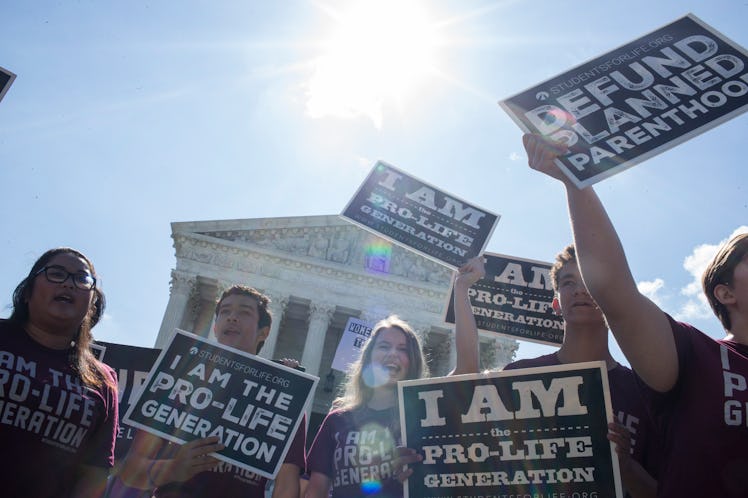
The Supreme Court Made A Major Decision On Crisis Pregnancy Centers & Abortion
The recent discovery of fake women's health centers (FWHC), also known as crisis pregnancy centers (CPC), has stirred quite the conversation in Washington D.C. At first glance these facilities come across as a standard women's clinic, but they're actually spaces that shame and stigmatize women. Well, these clinics have been the topic of debate in the court system, and the Supreme Court decision on crisis pregnancy centers was announced on Tuesday, June 26.
In the decision, the court voted 5-4 in favor of the crisis pregnancy centers, with Justice Clarence Thomas writing the opinion, joined by Justices Anthony Kennedy, Samuel Alito, Neil Gorsuch, and Chief Justice John Roberts. In the opinion, the majority ruled that a California act requiring CPCs, which are often related to Christian groups, to provide specific information in specific formats, including about abortion, "likely violates" the First Amendment. The law was reversed and remanded (i.e. sent back for further deliberation) to lower courts. Justice Stephen Breyer wrote the dissent, joined by Justices Ruth Bader Ginsburg, Sonia Sotomayor, and Elena Kagan.
The National Institute of Family and Life Advocates (NIFLA) vs. Becerra case features anti-abortion nonprofit NILFA as the plaintiff. According to NILFA's website, the nonprofit supports a "life-affirming pregnancy centers that empower abortion-vulnerable women and families to choose life for their unborn children." Becerra, meanwhile, refers to Democratic attorney general of California, Xavier Becerra. The case addresses a California law that added requirements to crisis pregnancy centers to provide more information to people seeking care there.
Becerra was defending The Reproductive FACT Act, which was signed into law in 2015 and requires these centers to post notices to clients letting them know about their right to affordable, low-cost family planning services in California.
The notices read,
California has public programs that provide immediate free or low-cost access to comprehensive family planning services (including all FDA-approved methods of contraception), prenatal care, and abortion for eligible women. To determine whether you qualify, contact the county social services office at [insert the telephone number].
In addition, clinics that aren't are not medically licensed must openly release that information to patients in another notice which reads,
This facility is not licensed as a medical facility by the State of California and has no licensed medical provider who provides or directly supervises the provision of services.
NILFA was fighting against this act by claiming that it violates First Amendment rights by forcing centers to mention abortion as an option for women (many CPCs are backed by Christian religious organizations, making this a question of religious beliefs and freedom). A case such as this is coming at a most inconvenient time for women's rights groups, especially with Trump-nominated Supreme Court Justice Neil Gorsuch, a conservative, helping decide its fate.
In March, Elite Daily spoke to a young woman, Caitlin H., about her experience accidentally stumbling inside a crisis pregnancy center, and the story is truly upsetting. According to Caitlin, the crisis center made her feel "disgusting" for having had sex and attempting to get an STD test. This is clearly the wrong message to send women attempting to be responsible in their adulthood, but unfortunately these fake women's health centers all too often get mistaken for legitimate women's clinics. This is largely because they often position themselves near women's health centers — especially those that provide abortions — and advertise themselves as places to get medical help in cases of unwanted pregnancies.
The case was heard by the Supreme Court on March 20, which is where those following it got to see a decent indication that the case would not go in favor of abortion advocates. As expected, the liberal justices on the court inquired into the work of CPCs themselves, with Justice Sonia Sotomayor in particular pointing out that they are not medically licensed facilities, and yet often advertise themselves as such. Justices Ruth Bader Ginsburg and Elena Kagan also brought up that abortion providers in many states are required to provide "informed consent," which means reading patients state-prescribed scripts (many of which include information not medically accurate, such as that abortion can cause breast cancer) as a parallel to the FACT Act's requirements.
In his dissent, Justice Breyer wrote about the history of First Amendment decisions — and in particular when those decisions applied to abortion. He noted that the court had previously ruled that "informed consent" was constitutional.
"If a state can lawfully require a doctor to tell a woman seeking an abortion about adoption services, why should it not be able, as here, to require a medical counselor to tell a woman seeking prenatal care or other reproductive healthcare about childbirth and abortion services?" Breyer posited.
However, some questions about the specific requirements of the FACT Act, including the variety of languages and the sizes of the signage, gave an indication that the case was going to be swung conservative.